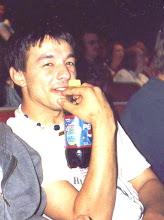Gov. Napolitano says meth 'ruining a whole generation' (Arizona)
http://www.zwire.com/site/news.cfm?newsid=16089576&BRD=1817&PAG=461&dept_id=222071&rfi=6
At a public open house in Coolidge on Friday, Gov. Janet Napolitano said the sale and use of crystal methamphetamine is the top problem in Arizona. She urged all citizens to gain a greater sense of urgency and encourage their legislators to support tough measures to restrict the sale of meth ingredients and stop the smuggling of the drug from Mexico.
During her first-ever stop to meet the people of Coolidge since becoming governor three years ago, Napolitano met for an hour with citizens and local officials at the City Council chambers on Feb. 3. During a 45-minute question-and-answer period, she spent the first 10 minutes responding to City Manager Bob Flatley's question, "What do you have to say about meth?"
"I don't have an answer, I have a speech," she replied. "This is our top problem in Arizona."
She said when meth first appeared it was called "crank" because it was frequently brought into Arizona by biker gangs from California and often smuggled in the crank cases of their motorcycles. Now it is produced locally and smuggled in large quantities from Mexico. Its use has grown exponentially in every county during recent years, she said.
When City Council member Judy Lopez told Napolitano that Coolidge had passed restrictions on over-the-counter sale of pseudoephedrines, the ingredients used to make meth, the governor shouted "Awesome!" and pumped her arms in the air.
"But why should this be done city by city, island by island?" Napolitano asked. "We should be doing this at the state level."
So far the state legislature has refused to do that, she said. "I suggest you write or call your representatives and ask, 'What are you thinking? What is it about public safety that's a mystery to you?"'
Napolitano said it would take both tougher enforcement and tougher laws to roll the meth invasion back from Arizona neighborhoods. Council member Jon Thompson asked if she felt meth should be removed from Proposition 200 restrictions that prevent judges from jailing drug users for a first offense.
"The problem is, it only takes one or two uses of meth to become addicted," Napolitano said. "We need to be able to get in there much more quickly. ... Meth is very different than marijuana."
Napolitano said she was proposing that the legislature authorize an extra $100 million for border enforcement, with most money going to the sheriff's departments of counties bordering Mexico and $25 million to boost the Department of Public Safety's patrolling efforts there.
"We also have to do a better job finding meth coming across the border," Napolitano said. "We have to deal with both sources of supply.
"And we need to have greater public awareness and urgency about this. Meth is to Arizona what crack was to the inner city. It's ruining a whole generation."
Napolitano responded to a number of other questions, particularly regarding school funding. A teacher who attended the meeting, which packed the council chambers and an adjoining police training room with citizens and city officials, said her classroom had no textbooks for children to take home, but only one book per desk - and not as many desks as there were children.
Napolitano said that those types of issues were mostly for local school boards and district administrators, as well as the State Facilities Board.
"We need to bring you up and meet with the State Facilities Board and force them to think and rethink the level of assets being placed in Pinal County," she said. "And do you need to rethink funding at the local level?"
The teacher said she had never seen a school before where kids were not allowed to take books home.
"Parents here are driving their kids up to Chandler so they can go to schools with textbooks," she said.
"That's where the local community needs to take charge," Napolitano said. "You can't just drive to Chandler. That's not a solution."
Coolidge resident Pam Leal said she disliked the state's formula for when districts are granted funds for new buildings, with "anything that has a roof on it considered as classroom space" so that new building funds aren't allocated until schools are already overcrowded.
"I hate for my children to be the stepping stone for the growth of tomorrow," Leal said.
City Airport Manager Matt Spitz said the future of the airport largely depended on what is done with the state-owned land surrounding it, and Napolitano introduced him to one of her staff members who deals with state trust land issues. Spitz also told her that restrictions imposed by the Central Arizona Project, which has canals bracketing the airport, prevent any new telephone or cable lines from being brought to the airport, either by tunneling under canals or hanging lines across them.
"We can't bring in any new telecommunications," Spitz said. "Right now we're pretty much stuck with what we've had since 1942."
"I didn't know that," Napolitano said, and joked, "We've got to get you your own satellite."
©Casa Grande Valley Newspapers Inc. 2006


0 Comments:
Post a Comment
Subscribe to Post Comments [Atom]
<< Home